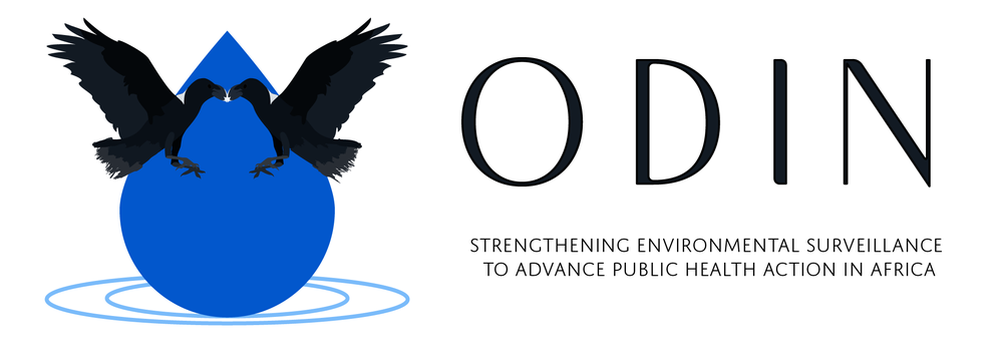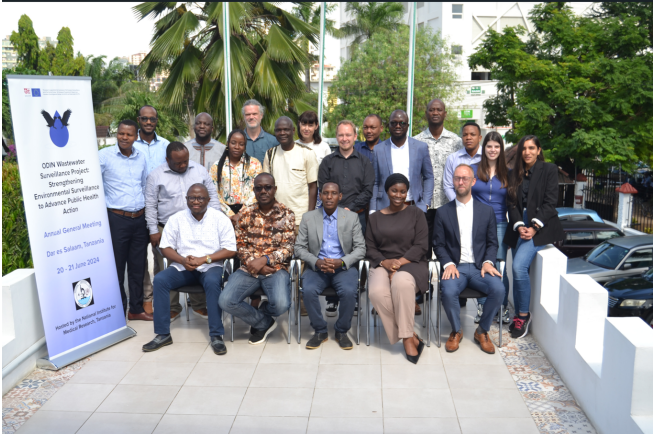

The Annual General Meeting of the ODIN project, focusing on improving environmental monitoring to advance public health initiatives, was successfully held in Dar es Salaam. Co-funded by the EU Horizon programme and hosted by the National Institute for Medical Research (NIMR), this hybrid event brought together stakeholders from several African countries and Europe to assess the progress and challenges of the project.
Progress of study sites
Principal investigators from the three main study sites – Democratic Republic of Congo (DRC), Tanzania and Burkina Faso – provided an update. Professor Vivi Maketa from DRC highlighted collaboration with the National Institute for Biomedical Research (INRB), staff training and ethical approvals obtained for project implementation. In Tanzania, Dr Vito Baraka described progress in wastewater monitoring and stakeholder networking. Marc Christian Tahita from Burkina Faso reported close collaboration with national authorities and ministries, and highlighted the readiness of laboratories and sampling sites.
Challenges to be met
Despite significant progress, challenges remain Delays in pilot sample collection, issues with availability of laboratory reagents and high sequencing costs were cited as obstacles. The sustainability of the capacities built in participating countries beyond the end of the project also remains a key point of discussion.
Highlights of the work modules
Each of the project's working groups (WPs) reported significant developments
-
WP1 & WP8 (Gestion et coordination du projet) Dirigés par le professeur Rolf Lood, ces groupes de travail se concentrent sur la gestion du projet et l'établissement de partenariats stratégiques Le groupe de travail 1 a réussi à recruter des conseillers clés, à finaliser des documents d'opinion en vue de leur publication et à rechercher des sources de financement supplémentaires Le WP8, qui gère la plateforme GenEpi pour les réactifs et la gestion des données, est sur le point de finaliser des accords clés.
-
WP2 (Surveillance) Dirigé par le professeur Tarja Pitkänen, le groupe de travail 2 a franchi des étapes importantes, notamment l'organisation d'un atelier pour les parties prenantes et la présentation des résultats de l'enquête dans une revue à comité de lecture. Des protocoles d'échantillonnage clés ciblant Salmonella typhi, Vibrio cholerae et les bactéries résistantes aux antibiotiques sont en cours de déploiement, avec un échantillonnage continu prévu pour l'automne 2024
-
WP3 (Laboratoires mobiles) L'équipe du Prof. Adriana Krolicka dans le WP3 a progressé dans la formation des travailleurs des laboratoires mobiles et dans l'élaboration de protocoles pour le travail sur le terrain Des prélèvements ont déjà été effectués à Dar es Salaam, et deux kits de contrôle de la qualité sont en cours d'évaluation afin d'améliorer la fiabilité des prélèvements.
-
WP4 (Partage et stockage des données) Dirigé par le Dr. Sakina Bombaywala, le WP4 a soulevé des discussions critiques sur l'infrastructure de partage des données L'équipe évalue les processus automatisés de téléchargement des données vers les bases de données publiques et débat de l'emplacement du serveur, en Afrique ou en Europe, afin de garantir un accès efficace et un stockage à long terme.
-
WP5 (Évaluation des risques et intervention) Coordonné par le Dr Marc Christian Tahita, le WP5 s'intègre aux WP2 et WP3 pour s'assurer que les données provenant d'échantillons environnementaux et cliniques éclairent les interventions de santé publique. Des travaux sont en cours pour développer des plans de sécurité et d'assainissement de l'eau alignés sur les lignes directrices de l'OMS, avec des efforts pour évaluer les impacts économiques et les résultats en matière de santé.
-
WP6 (Renforcement des capacités) Dirigé par le Dr Vito Baraka, le groupe de travail 6 s'est concentré sur la création de programmes de formation pour les scientifiques locaux et sur l'amélioration des collaborations régionales Un hub central a été lancé au début de l'année 2024, qui a déjà attiré un trafic important en provenance des pays africains, signe d'une diffusion efficace des connaissances
-
WP7 (Communication and Dissemination) WP7, coordinated by the Global Health Network, focused on the importance of outreach and communication. The team developed a multi-platform communication strategy, including Teams groups, LinkedIn and newsletters. The launch of a dedicated data sharing hub and a tool to track upcoming publications were highlighted as key tools to ensure transparency and accessibility of the project results.
Speeches and discussions
Keynote speakers included Andreas Berglöf of WaterAid Sweden, who highlighted the need to improve water, sanitation and hygiene (WASH) infrastructure globally, particularly in regions where inadequate sanitation contributes to high child mortality rates. Professor Gerald Misinzo of Africa SACIDS proposed the “7-1-7” strategy to improve pandemic preparedness, advocating early detection and rapid response to control outbreaks within 15 days.
In a roundtable discussion, experts discussed the importance of tailoring science communication to different stakeholders, emphasizing the need to bridge the gaps between research, policy and public health action.
Conclusion
The AGM concluded with a call for strengthened collaborations, emphasizing the need for long-term sustainability of the ODIN project's environmental monitoring efforts. The importance of integrating the project's results into national public health systems was highlighted, and attention was focused on securing additional funding and building capacity to meet future public health challenges.
Also By
- 1er webinaire ODIN : le consortium partage ses connaissances sur les stratégies d'innovation, de résilience et de durabilité
- 1st ODIN Webinar: The Consortium Shares Insights on Innovation, Resilience, and Sustainability Strategies
- Projet ODIN de Surveillance des eaux usées : Campagne d'échantillonnage terminée
Please Sign in (or Register) to view further.